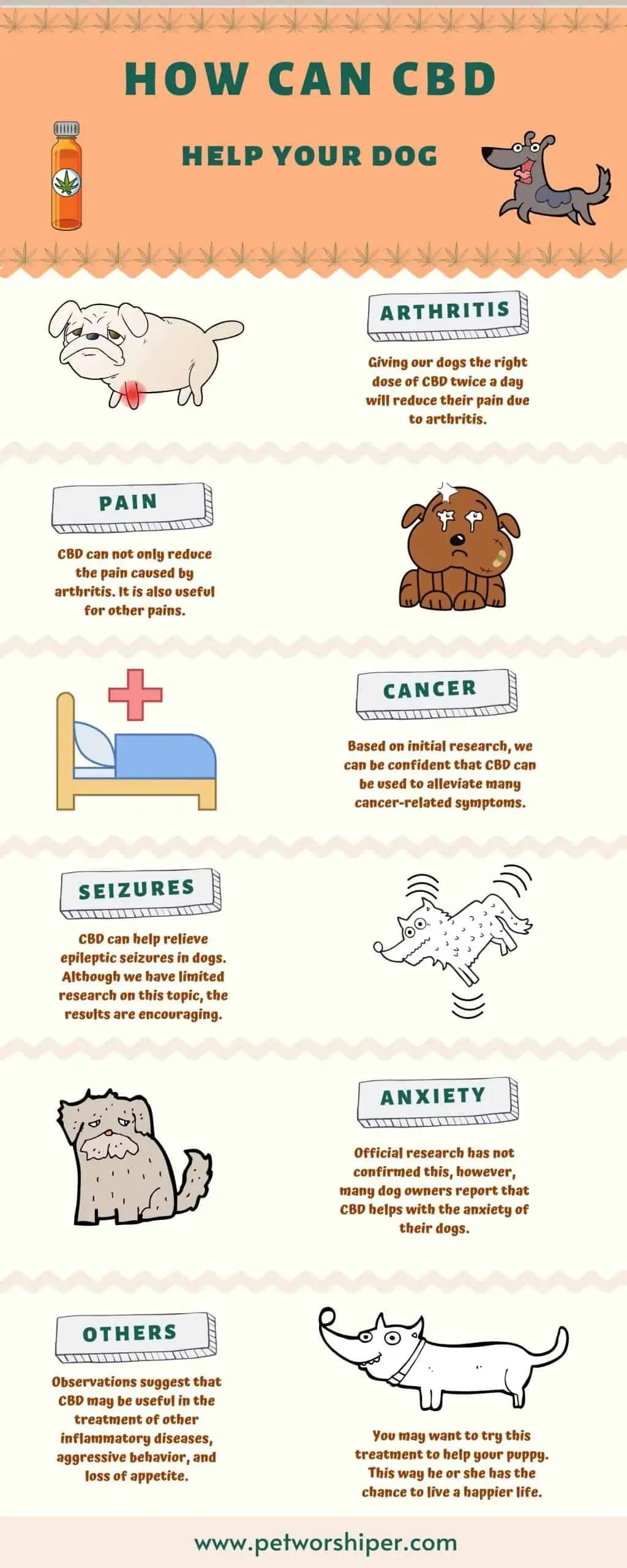I honestly admit, a few years ago I had no idea that CBD existed. I mean, sure, they taught me in school what chemicals are in marijuana besides THC. But that somehow didn’t stay in my head. Then I came across CBD products. I tried it personally and I really liked the effect. Only later did I find out that CBD products were made for animals too. I guess I’m not alone in wanting the best for my dogs. So I went over the topic a little bit.
What is CBD?

Cannabidiol (known as CBD) is a compound found in cannabis and hemp. Unlike tetrahydrocannabinol (THC), it’s nonpsychoactive. You or your pet won’t get high. It’s important to mention, most CBD products are derived from hemp and not from marijuana. This compound is under continuous testing and research. But already, some studies have proven that it may be helpful with some conditions. Anxiety, pain, cancer, and arthritis, these are examples where CBD has been useful.
CBD for animals?
We need to understand that for the time being, these are little results in deciding how effective and safe CBD is. It is also important to mention that most of the researches discussed above were conducted in humans. There are no CBD products approved by the FDA for use in animals. For now, we can mostly rely on the experience of the owners. However, in many cases, they are linked to human cases.
Health benefits?

Human studies have shown that CBD helps with the following diseases. Let’s see what about pets!
Arthritis
Arthritis is the abbreviation for osteoarthritis. This is one of the most common inflammatory conditions in dogs. One in four dogs has arthritis at least once in their life. And many more of them have some degree of this disease. Research has shown that CBD can reduce pain in dogs with arthritis. You should give your dog CBD twice a day at the right dose.
Pain
As with arthritic complaints, we can treat our dogs with CBD for other inflammatory pains. Human experiments have proven that products containing both CBD and THC are more beneficial for pain relief than when either is given alone. But as I will mention below, it is not advisable to give THC to dogs.

Seizures
Most CBD research in humans is on seizures. Unfortunately, limited research exists for pets. Nonetheless, there are correlations. Especially in epileptic seizures, CBD has been found to be useful in dogs. However, these benefits were noticeable when dogs were given traditional anti-seizure medications.
Cancer
Like seizures, there are many types of cancer with different treatments. There are also CBD researches to treat cancer directly and alleviate secondary symptoms of cancer and chemotherapy. Unfortunately, little research has been done on dogs, but it seems promising. However, chemotherapy-induced nausea was reduced in CBD rats. This gives us reason to trust that the results will be the same with dogs.
Anxiety
The most commonly reported effect of CBD is to reduce anxiety. Unfortunately, the situation is not too bright here for dogs. There is no evidence that CBD would help them in this case. More research is needed.
However, there are owners who reported that CBD helped with their dogs’ anxiety.
Others
Other inflammatory diseases, aggressive behavior and loss of appetite. These are just a few examples of where CBD can still be effective.
Is it safe?
When it comes to THC, the answer is clear. It does not have the same effect on pets as humans and can be dangerous to them. But what about CBD? Is it better? Probably yes.
According to a 2017 World Health Organization (WHO) report, it’s safe and well-tolerated by animals. Vets, on the other hand, agree that CBD should not be given to a pet who has liver problems. The situation is similar when an animal is taking a medicine that’s metabolized by the liver.
Side effects?
There is no scientific data on the side effects of CBD on animals. Still, we can infer from examining side effects in humans. These side effects are dry mouth, lowered blood pressure, and drowsiness. Always adhere to the recommended dose and, if possible, start with a smaller amount and increase gradually.
What to look for?

Alright. You know the potential advantages and disadvantages. Then you decide if you want to give CBD to your dog. Here are some things to keep in mind:
Research
Chances are you will buy CBD online. Remember, on the internet, they want to sell you a lot of things. Don’t fall for the marketing stuff. Look for online reviews. It’s not a bad idea to start with negative reviews. Check the company. How long have they been in business? Have they been sued? Do they work with veterinarians?
Keep locked
If your dog accidentally comes across an unlocked CBD box, rest assured he won’t eat the prescribed daily amount of it. To keep your dog safe, be sure that you keep any CBD products out of your dog’s reach. Also, do not keep it together with other treats.
Always choose high-quality products
The price of the product should not be the deciding factor in your choice. Higher prices usually mean higher quality. Look for organic, so it’s less likely to have pesticides, fungicides, or solvents. Make sure it is free of additives.
The manufacturer also should provide the documents that tell you the amount of CBD in the product. You also need to make sure there is no THC in the product.
Best ways
CBD products come in many forms. Treats, oils, creams, like human products, there is a wide selection here too. There is some evidence that the oil form was more effective than the others. Dosing is also much easier with this form.
Dosage
According to one study, the most effective dose with arthritis was 2 mg per kg of weight. However, be skeptical and do not take it as a basic recommendation. Each dog will react a little differently. Most products will offer dosing suggestions. But keep in mind that these are only the manufacturers’ recommendations. Since CBD isn’t regulated, no one will be able to say for sure how safe or effective it is.
The best thing you can do is start with the smallest amount possible. Then increase the dose gradually. Pay close attention to your dog’s reaction. This will help prevent possible overdose reactions.
Always talk to your vet
Last but not least, it is very important to talk to your veterinarian. He will know your dog’s medical history and breed information. He may not recommend giving CBD to your dog. I’m not saying you have to listen to him in this case. But at least you played a sure game and talked to a professional about the problem.

Summary
As you can see, it is very difficult to give clear advice on CBD. It is a very little researched product, especially for dogs. This is likely to change in the future, as demand for it is already high. Personally, I may be going to give it a try in the future. At least if my dog is going to suffer from any of the problems discussed above.

